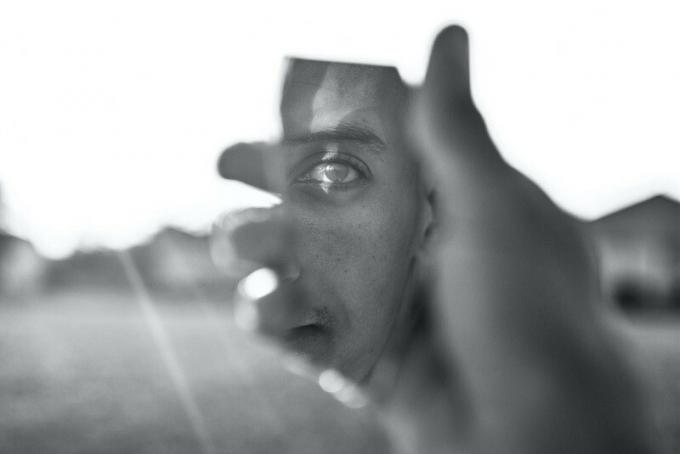Who I am? A look at my narrative
I am the result of my words, my stories, my memories.
I am the story I have chosen to be told. Am the evolution of my words.
The Narrative of Identity
To start this narrative I wanted to put into practice the uncomfortable question, the one that invites us to talk about ourselves, in the first person; that's why today I wanted to look at myself in the mirror for a few minutes, trying to find, formulate and build an answer that gives relief to the anguish that appears on the path of the search for meaning through identity, a construction that is built every day, brick by brick. brick; sometimes dark, pastel, and lucid colors, other days, colorless and uniform.
I tried to accommodate several answers and realized the temporary value of my words, that what Yesterday I cared and defended feverishly, today it goes unnoticed like the drizzle on a summer afternoon. summer. This is my story.
I am Lina. No. That's my name, but it has a emotional charge very important. That does not belong to me properly but that
gives meaning to my existence through the eyes of my parents, my ancestors and my culture.I am the daughter of Oscar and Lucy. It's not my identity, it's my parents.
I am a psychologist and coach. No. That's my profession. And so on, until I ran out of all the possible answers to the quest for my identity. Then…
I am my stories.
I am the narration of my identity.
I am my memories. I am my culture, I am my language.
Today I am what I thought yesterday, tomorrow I can be what I think today. I am a subjective construction that responds to my concept of happiness.
One of the robust dilemmas that most determines our existence is explained by this question: Who am I? We try to respond to it during our lives and we adjust to our realities and perceptions, and thus, we are empowering ourselves with a resounding and constant discourse that is taking on shades and nuances around our reality.
To give focus to this question, we are going to try to understand the logic of our narrative. Let's start by understanding what identity is.
- Related article: "Personal Development: 5 reasons for self-reflection"
The identity
Identity is not something fixed, it is mobile and dynamic. It has a temporal dimension; that is to say, it is a told story, nourished by stories, the same ones that I give meaning to with my words. In addition, it is the result of a life recounted, examined, resumed. We are narrative.
Memories, ours, give meaning to identity. The identity that inhabits us. We are words. So, the first word that inhabits me is my name. That name that comes loaded with expectations, dreams, ideals, some labels that can become stereotypes and other generational charges brought by that word that will talk about me all my life. So, saying that "I am Lina" responds to the meaning and logic of my identity? No. But it does burden me with those borrowed words, which do not belong to me but unfortunately accompany me until I am aware that they are not mine.

I am the legacy. We are what we pick up from previous generations. I am my language, that sound identity, the one that gives meaning to the way I see the world. Legacy refers to cultural determination, that call of belonging.
I am the writer, narrator and protagonist. Be determined with your words, because they will determine your character. Words define and give shape and meaning to who I am, who I want to be and how to achieve it. So, from the logic of building a narrative that accounts for what I want to be, we are going to identify the key elements that we have to make our own identity sustainable.
I am the engineer, builder and architect of the house I am going to build. I'm the one telling the story. What story do you want to tell?
- You may be interested: "Self-concept: what is it and how is it formed?"
The structure of identity
I am going to build a house that will be the order of my identity, the answer for the "I"; the challenge is to identify the words that determine the stories that inhabit me and which of these are mine by definition; understanding that difference will determine the path to freedom and adjustment to happiness in terms of subjectivity and enjoyment.
The foundation words They are the foundation of the house. You can make them as strong as you want; remember that everything depends on your words.
the column words they are ours values, and the values are what matters to us; think about those non-negotiables, and you will know that right there are your columns.
the ladder words are those that drive us to climb our dreams and challenges. It is those stairs that lift us up but from time to time also leave us in the storage room; and it is right there in the storage room where we find what does not serve us and that in fact hinders us (in the storage room you find even your greatest fears).
Once you arrive at the storage room, sadness, anguish, loneliness, nonsense and disorder inhabit you. What is the movement that accompanies you once you arrive at the storage room? Do you clean it, or do you move forward without looking back? Those stairs are the impulse you have to always move forward.
The Windows; these words are determining for the house. The window words account for the subjective meaning of happiness. Here is our enjoyment, inspiration, flow experiences that nourish our soul. They are those memories that we collect, our hobbies.
How many windows does your house have? Do you find them closed or open? Are they easy to open? These are questions that bring us closer to the moments that are worth living over and over again.
Last but not least, there are the words door. Those doors are what allow us to open new cycles, and also close them. How many doors do I have open today in my house? With what key am I opening the doors?
There is a key that is the only one that works for all the doors; that is the key of trust, which allows me to enter and exit freely. After all, I am the result of my stories, of my memories, of that narrative that I tell myself every day and that refers to what I am and how I relate to my environment.
- Related article: "Self-knowledge: definition and 8 tips to improve it"
concluding
Once I am able identify the borrowed words that inhabit me, and incidentally I have the courage to eliminate them from my narrative, I can have the certainty of freedom, and freedom is the word that comes closest to happiness.
Freedom; she is there willing to be part of your experiential discourse, but you have to appropriate what is truly yours to do yourself the honor of living it. After all, today you are the result of the stories you told yourself yesterday; Tomorrow you will be the stories you tell yourself today.
For this, make sure you build stories and narratives that inspire you, that connect with your purposes, with greater certainty and security.
When you are able to take responsibility for the coherence of your words and your stories, then you are ready to live, and life is worth living.
And you, in what story do you want to be told?
Tell me about you.


